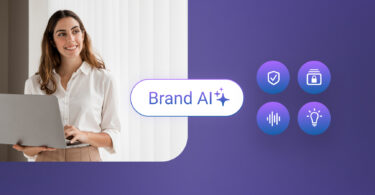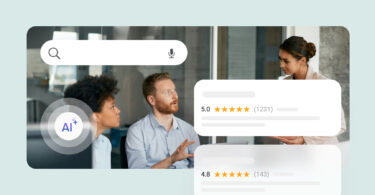In some ways, connecting with customers has never been easier. There are so many communication channels and tools you can use to streamline customer interaction.
But ironically, connecting with customers has also never been more challenging. You’ve got many useful tools and platforms at your disposal, but that comes with various obstacles. You need to choose the right tools, keep customers happy, and strike the right balance between automation and authenticity.
It’s overwhelming, to say the least.
Providing excellent, real-time service is vital for keeping customers happy and driving business growth. But if you’re not sure which communication channels you should leverage, you’ve come to the right place.
In this article, we’ll compare two popular messaging choices: Facebook Messenger vs text messaging. You’ll learn the pros, cons, and ideal use cases for each.
Table of contents
Need a quick answer? Here’s an overview of when to choose between texting and Messenger: Texting: Ideal for direct, immediate customer communication, especially for appointment reminders, urgent updates, and local outreach. It's personal, has high open rates, and doesn’t require social media engagement. Messenger: Best suited for businesses with a strong Facebook presence looking to leverage social media followers and handle customer service inquiries. It's also advantageous for international communication without extra costs. The best approach: Leveraging both text messaging and Facebook Messenger contributes to an omnichannel communication strategy. This blended approach not only meets customer expectations but also maximizes engagement opportunities for your business — everybody wins.
SMS vs. Messenger: What’s the difference?
At first glance, text messaging and Facebook Messenger seem quite similar. The truth is: they are! Both facilitate real-time communication via mobile devices. But there are some important distinctions between Messenger and text messaging.
What is Facebook Messenger?
Facebook Messenger is a free instant messaging app owned by Facebook. The application is used actively by over 1 billion people on both mobile and desktop devices. With Facebook Messenger, users can:
- Have plain text conversations
- Participate in video and voice calls
- Share photos, videos, and gifs
- Send and request payments
Users can message friends, family members, and businesses with a Facebook presence.
What is business text messaging?
Business text messaging refers to the use of SMS and MMS messages to communicate with customers via their mobile devices. Use cases include sending promotions, appointment reminders, order notifications, and other alerts directly to customers’ smartphones.
This communication channel can be a game changer for businesses — it’s quick, it’s effective, and customers actually prefer it. In fact, according to a study by Google and Forrester, 68% of consumers are more likely to purchase from businesses that offer convenient communications. And since people pick up their phones about 144 times a day, there’s no form of communication more convenient than texting.
Manage Conversations from a Single Inbox
Facebook Messenger vs texting? Birdeye can help you connect with customers on both!
4 benefits of using Facebook Messenger
Here are some of the major advantages to messaging customers via Facebook Messenger vs traditional text messaging:
1. Expand your audience
With over 3 billion monthly active users, Facebook is the largest social networking site — so there’s a good chance that your target audience already spends time there. Facebook Messenger allows you to message anyone who follows your business page. By tapping into Facebook’s huge user base, growing your Facebook follower count, and using Messenger to engage with those followers, you expand your reachable audience beyond just customers who have shared their phone numbers with you.
2. Generate and convert leads
When a customer messages a business on Messenger, it is often with a sales inquiry or appointment booking request. Each new message thread initiated by a customer via Messenger represents a real-time signal of their interest and intent, and the likelihood of converting high-intent leads into customers is strong. By engaging promptly through Messenger, you can harness this strong potential for conversion and boost your bottom line.
3. Provide support efficiently
Facebook Messenger enables prompt, responsive, personalized customer support. You can even reduce the workload on your team while simultaneously slashing response times by setting up automated responses in Meta Business Suite. Providing instant answers to frequently asked questions directly through Messenger will help customers feel heard and prioritized, which will lead to increased customer satisfaction levels.
4. Avoid international fees
Another major advantage of Facebook Messenger vs texting is that, with Messenger, you can communicate with and provide support to customers anywhere in the world without incurring any long-distance call or international text messaging fees. This feature is particularly beneficial if you’re considering expanding internationally or want to interact with consumers globally but don’t want to break the bank.
When to use Facebook Messenger
Wondering when to use Facebook Messenger? Messenger best serves organizations that:
- Want to connect with existing social media followers and clients
- Seek to capture leads from Facebook traffic
- Have an established Facebook presence and active following
- Offer products or services with global appeal
- Require a free messaging solution
- Wish to enable efficient omnichannel workflows
- Desire unlimited international reach
To summarize, Messenger allows you to expand your reach, turn Facebook followers into paying customers, and interact with global customers, so it may be a better option than SMS messaging for some brands. Either way, adding this channel to your overall communication strategy will make your brand more accessible and boost customer loyalty.
4 benefits of text messaging
Messenger has a lot of benefits, but don’t count out text messaging just yet. Let’s look at some of the benefits of using text as a customer communication channel.
1. Ultra-high open rates
Text messaging has incredibly high open and response rates compared to other communication channels.
Approximately 98% of SMS text messages are opened within a few minutes of delivery. This dominates the 20-30% open rates for email marketing campaigns. But how does Facebook Messenger compare? While open rates are higher than email, most people report open rates between 70-88% on Messenger.
2. Direct access to customers
Unlike with Messenger, you don’t need a customer to follow you on social media in order to text them. As long as you have their mobile number, you can reach them instantly — and you don’t have to worry about whether or not they have the Messenger app installed. This direct and reliable line of communication can be particularly beneficial for urgent or time-sensitive messages that can’t afford to go unseen.
3. Personalized feel
Texting feels personal — like you’re messaging a friend, even if you’re actually messaging a business. The intimate, casual feel of text message conversations builds closer customer relationships rooted in trust. Customers feel prioritized and engaged when you text them directly. Texting carries a more personalized tone compared to Messenger, email, and other channels.
4. No Spam Filters
Texting provides a direct communication channel to customers, bypassing the clutter of social media inboxes. Unlike messages on Facebook Messenger, which may get lost amidst numerous other messages or even filtered out as spam, text messages land straight into a customer’s main messaging inbox. If you want your message to be seen, text gives you the best odds.
When to use text messaging
Wondering when you should text your customers? Here are a few common scenarios where text messaging shines:
- Send appointment reminders or confirmations.
- Fire off bulk messages and marketing promotions or offers.
- Collect customer feedback through surveys.
- Provide order or delivery updates.
- Send payment reminders or confirmations.
- Send event invitations or updates.
- Maintain personalized, friendly communication.
To summarize, your business can benefit tremendously from texting customers. Text is convenient, personal, and gives you the best possible odds of your message being seen.
Keep compliance in mind
It’s important to note that in order to use text messaging legally and ethically, you must follow consent and opt-out regulations for direct messaging that apply in your country or region.
Specific compliance rules vary globally, but the core requirements are consumer consent and easy unsubscribe options. Customers must explicitly opt-in to receive business text messages, either verbally or through written consent (via a website checkbox, for example). And they must be able to easily opt back out at any time directly within messages.
Should You Use messenger or text Messaging?
Messenger and Texting have unique benefits for businesses, but how do they fare against each other? Our comparison table makes the decision easier for you:
| Feature | Facebook Messenger | Text Messaging |
| Target audience | Existing Facebook users and followers | Diverse audience – anyone who interacts with the brand and provides a phone number |
| Reach | Global | Hyperlocal |
| Primary goals | Brand awareness and outreach | Business-related communications – product stock updates, appointment reminders, notifications on changes in store time, etc |
| Cost | 100% free | Based on the provider, however, it carries a per-message cost |
| Integration | Easy to integrate with most CRMs and automated platforms | Integrates well with CRM and automated platforms |
| Ease of use | Requires minimal training | Easy to use |
| Customer experience impact | Streamlines communication by allowing customers to connect online with the business | Integrates well into omnichannel communication modes, allowing businesses to reach customers instantly |
| Compliance requirements | Subject to various data privacy regulations (e.g., GDPR, CCPA) and industry-specific requirements. | Subject to data privacy regulations, including 10DLC, but generally less complex due to the nature of the channel. |
Both Facebook Messenger and text messaging offer unique advantages for businesses. The optimal choice depends on your specific audience, goals, and budget. By strategically leveraging both channels, you can create a more comprehensive and effective omnichannel communication strategy to enhance customer engagement and satisfaction.
Text vs Messenger FAQs
Text message and iMessage differ mainly in platform availability and features. Text messages use the SMS protocol and work on any phone, while iMessage is exclusive to Apple devices with features like read receipts, typing indicators, and end-to-end encryption.
Facebook Messenger is a free instant messaging app that allows media sharing, group chats, and video calls. It allows international messaging without extra charges, unlike texting, which may incur additional fees. Businesses can use Facebook Messenger to connect with their Facebook followers and decrease response times.
People may prefer Facebook Messenger for its integration with the social network, the ability to send media-rich messages, make voice and video calls, and communicate globally without additional costs.
No. Messenger offers end-to-end encryption in secret conversations, providing a level of security that traditional SMS lacks. However, the overall safety could also depend on individual privacy settings and practices. As with any communication channel, it’s important to understand the privacy policies of the platform and to use available security features such as enabling encryption and using strong, unique passwords.
Some cons of Messenger include potential data privacy concerns, the requirement of a stable internet connection, and the necessity for both parties to have a Messenger account for communication. When a business uses Messenger to message their customers, the message is at risk of being flagged as spam or getting lost in an overcrowded inbox.
Convert more customers on more channels with Birdeye
Now that you understand the advantages of using Facebook Messenger vs phone text messages, it’s time to think about the bigger picture. Connecting with customers on their preferred platforms is a good first step, but if you want to drive growth, you must transform conversations into sales.
With Birdeye, seamless messaging is just the beginning. Our all-in-one platform helps thousands of businesses like yours:
- Meet customers on any messaging channel — SMS, Facebook, and more — all from one centralized inbox.
- Respond 10x faster using automated intelligence.
- Build trust and loyalty with 5-star customer experiences.
- Generate reviews, referrals, repeat sales, and appointments.
Learn how Birdeye’s can optimize your customer engagement, boost satisfaction, and improve your bottom line. Request a demo today.

Originally published


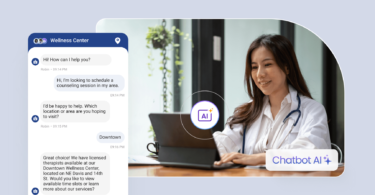

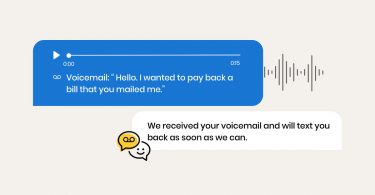
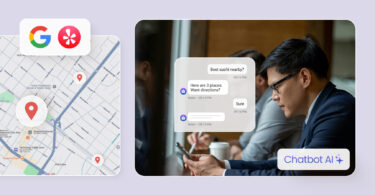
![[Feature image] The best AI tools for business in 2025 A complete guide for productivity, content, and growth](https://birdeye.com/blog/wp-content/uploads/Feature-image-The-best-AI-tools-for-business-in-2025-A-complete-guide-for-productivity-content-and-growth-375x195.jpg)
